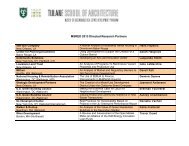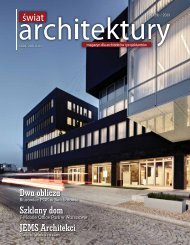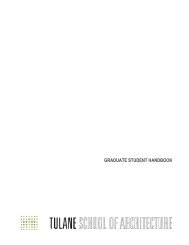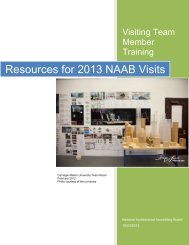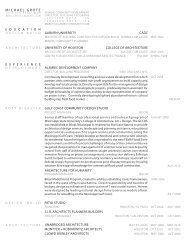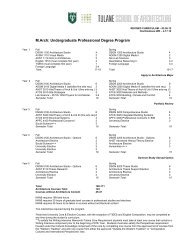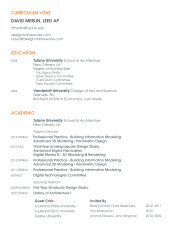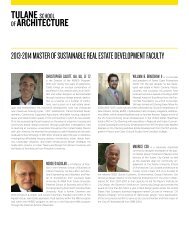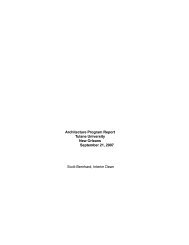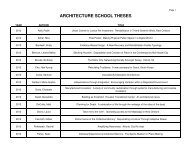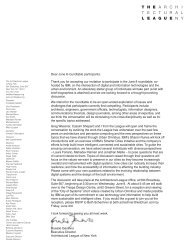NAAB Architecture Program Report (APR) 2013 - Tulane School of ...
NAAB Architecture Program Report (APR) 2013 - Tulane School of ...
NAAB Architecture Program Report (APR) 2013 - Tulane School of ...
Create successful ePaper yourself
Turn your PDF publications into a flip-book with our unique Google optimized e-Paper software.
<strong>Tulane</strong> University<strong>Architecture</strong> <strong>Program</strong> <strong>Report</strong>September <strong>2013</strong><strong>Tulane</strong> <strong>School</strong> <strong>of</strong> <strong>Architecture</strong>’s low student/faculty ratio allows most members <strong>of</strong> the faculty to becomeacquainted with the majority <strong>of</strong> students and to advise them informally on academic matters as well aspr<strong>of</strong>essional and general concerns. First and Second Year students <strong>of</strong>ten need special advice onarchitecture as their career choice. The design faculty <strong>of</strong> these years is particularly sensitive and responsiveto these needs. Students are given ongoing feedback on their progress throughout this period, and acomprehensive design review concludes the spring semester <strong>of</strong> Second Year.The <strong>School</strong> <strong>of</strong> <strong>Architecture</strong> alumni are another valuable resource in career advising and facilitation. Ouralumni practice throughout he United States, in architecture and a variety <strong>of</strong> related fields. These successfuldesign pr<strong>of</strong>essionals <strong>of</strong>ten prefer to hire <strong>Tulane</strong> graduates, and are effective area contacts for the studentseeking employment. Further information on the TSA’s Career Advising activities can be found here:http://architecture.tulane.edu/careers/advisingSupport <strong>of</strong> Field Trips and Other Off-Campus ActivitiesThe Dean has supported numerous student field strips and <strong>of</strong>f campus activities including AIASparticipation in Quad Conferences and the National Forum, with as many as ten <strong>Tulane</strong> students inattendance in the latter and many more in the former. The Rome field trips are entirely funded by the<strong>School</strong> as part <strong>of</strong> that program. Several recent study abroad programs have been subsidized substantiallywith private donor funds.Students also participate in the yearly “Day <strong>of</strong> Caring” program <strong>of</strong> public service, working in the communityon improvement projects alongside faculty, staff and community non-pr<strong>of</strong>it partners. Many individualstudent organizations have their own programs <strong>of</strong>f campus and ASG has funding from the central StudentGovernment through student activity fees which gives them significant autonomy in deciding how to directtheir own funding for these purposes.Participation in Student OrganizationsThe <strong>School</strong> <strong>of</strong> <strong>Architecture</strong> has its own student government organizations. They plan student activities,hold student meetings, attend faculty meetings, and administer the annual Faculty Award. <strong>Tulane</strong> studentsare active in campus and national student affairs.<strong>Architecture</strong> Student Government (ASG)ASG is an organization representing the entire architecture student body and funded by <strong>Tulane</strong>’s governingUniversity Student Government (ASG). They organize and empower the student body <strong>of</strong> TSA in the spirit <strong>of</strong>responsibility to the community and the public. They are involved in organizing lectures and social eventssuch as TGIF, Beaux Arts Ball and the annual Faculty Auction. One <strong>of</strong> ASG's main focus <strong>of</strong> the school yearis planning <strong>Architecture</strong> Week (http://architecture.tulane.edu/outreach/architects-week). ASG is made up <strong>of</strong>an executive board (President, VP, Treasure, Secretary and Senator to USG) and class representativesfrom each year. General elections are held in the spring semester and elections for First Year occurs at thebeginning <strong>of</strong> the fall semester.<strong>School</strong> <strong>of</strong> <strong>Architecture</strong> Graduate Government (SAGG)The <strong>Tulane</strong> <strong>School</strong> <strong>of</strong> <strong>Architecture</strong> Graduate Government is an organization committed to the strengthening<strong>of</strong> the graduate student community. Its main purpose is to facilitate a relationship between graduatestudents, faculty, the administration, the University, alumni, pr<strong>of</strong>essionals, and the community at large.Additionally, SAGG is equipped to further empower the graduate body and provides the resources neededto reach their greatest creative potential. The funding <strong>of</strong> Student Initiated Projects (SIPs) is but one toolSAGG utilizes to meet this goal. Any graduate student can prepare a proposal to improve something at the<strong>School</strong> <strong>of</strong> <strong>Architecture</strong> and present it to the government. One recent example <strong>of</strong> this is the graduate workpublication, "Recto Verso," the publishing <strong>of</strong> which is funded by SAGG. Finally, SAGG has an importantrole in the Graduate Colloquium. Though there is a separate committee dedicated to the organization andexecution <strong>of</strong> the Colloquium, SAGG is a major partner in funding it. SAGG hosts a social gathering forgraduate students and visiting prospective graduates during the Colloquium weekend to help prospective33



